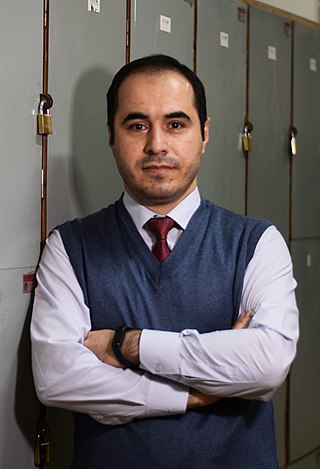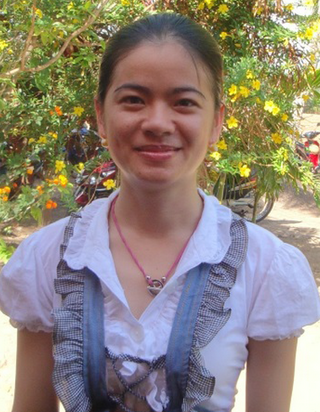
Evin Prison is a prison located in the Evin neighborhood of Tehran, Iran. The prison has been the primary site for the housing of Iran's political prisoners since 1972, before and after the Iranian Revolution, in a purpose-built wing nicknamed "Evin University" due to the number of students and intellectuals housed there. Evin Prison has been accused of committing "serious human rights abuses" against its political dissidents and critics of the government.
White torture, often referred to as white room torture, is a type of psychological torture technique aimed at complete sensory deprivation and isolation. A prisoner is held in a cell that deprives them of all senses and identity. It is particularly used in Iran; however, there is also evidence of its use by Venezuelan and United States intelligence services.
Bahareh Hedayat is an Iranian activist and campaigner for women's rights. She was one of the activists who worked on the One Million Signatures campaign to change laws that discriminate against women in Iran. She has been arrested and imprisoned several times.
Zeynab Jalalian is a Kurdish Iranian who has been convicted a mohareb and sentenced to death by an Islamic Revolutionary Court for allegedly being a member of the Kurdish militant group PJAK, which she denies. Jalalian's sentence was later reduced to life imprisonment.
Human rights organizations have condemned Jalalian's verdict, torture, conditions of incarceration and the inattention to her medical care.

Majid Tavakoli is an Iranian student leader, human rights activist and political prisoner. He used to be a member of the Islamic Students' Association at Tehran's Amirkabir University of Technology, where he studied shipbuilding. He was arrested at least three times by the Iranian Ministry of Intelligence, during the student protests over the disputed Presidential Election of 2009. In response to allegations that he cross-dressed as a disguise to avoid arrest, a campaign protesting his imprisonment featured men posting photos of themselves wearing hijab.

Nasrin Sotoudeh is a human rights lawyer in Iran. She has represented imprisoned Iranian opposition activists and politicians following the disputed June 2009 Iranian presidential elections and prisoners sentenced to death for crimes committed when they were minors. Her clients have included journalist Isa Saharkhiz, Nobel Peace Prize laureate Shirin Ebadi, and Heshmat Tabarzadi. She has also represented women arrested for appearing in public without a hijab, which is a punishable offense in Iran. Nasrin Sotoudeh was the subject of Nasrin, a 2020 documentary filmed in secret in Iran about Sotoudeh's "ongoing battles for the rights of women, children and minorities." In 2021, she was named as of Time's 100 Most Influential People in the World. She was released on a medical furlough in July 2021.

Hossein Ronaghi Maleki better known as Hossein Ronaghi is an Iranian human rights activist and blogger. He has spent a total of 6 years in prison since 2009 for his activities. In 2022, after his re-arrest he became one of the well-known faces of Mahsa Amini protests.
Kouhyar Goudarzi is an Iranian human rights activist, journalist and blogger who was imprisoned several times by the government of Iran. He previously served as an editor of Radio Zamane. He is a member of Committee of Human Rights Reporters (CHRR), serving as the head from 2005-2009.

Sayed Ziaoddin Nabavi, also known as Zia Nabavi, is an Iranian student activist. He previously served nine years of a 10-year sentence on charges of "creating unease in the public mind" before being released in February 2018.
Mohammad Davari is an Iranian journalist. After he documented abuses of prisoners at Kahrizak detention center, he was sentenced to five years in prison by the Iranian government, drawing international protest on his behalf.

Narges Mohammadi is an Iranian human rights activist and Nobel laureate. She is the vice president of the Defenders of Human Rights Center (DHRC), headed by her fellow Nobel Peace Prize laureate, Shirin Ebadi. Mohammadi has been a vocal proponent of mass feminist civil disobedience against the hijab in Iran and a vocal critic of the hijab and chastity program of 2023. In May 2016, she was sentenced in Tehran to 16 years' imprisonment for establishing and running "a human rights movement that campaigns for the abolition of the death penalty." She was released in 2020 but sent back to prison in 2021, where she has since given reports of the abuse and solitary confinement of detained women.

Kasra Nouri is an Iranian journalist and political activist. He was the CEO of "Majzooban-e noor" website, which covered news about the Dervish religious community, Nouri was last arrested with his family during 2018 Dervish protests and sentenced to 12 years in prison and 148 lashes.
Maryam Shafipour is an Iranian human rights activist. Following seven months of pre-trial detention in Evin Prison, including more than two months in solitary confinement, Shafipour was sentenced in March 2014 to seven years in prison for her political activities. Human rights organization have called for her release and condemned her conviction and prison sentence. She was released in July 2015.
Gholamreza Khosravi Savadjani was a political prisoner in Iran who was executed on 1 June 2014. His execution was highly controversial due to accusations that Khosravi did not receive due process or fair treatment during his trial or leading up to his death.
Ghoncheh Ghavami, also spelled as Goncheh Ghavami, is a British-Iranian law graduate of the School of Oriental and African Studies, University of London who was held in solitary confinement in Evin Prison for protesting for equal access to sporting events in Iran.

Hossein Rajabian is an Iranian filmmaker, writer and photographer who was imprisoned as a political prisoner in 2015 on charges related to his filmmaking. He as an anti-censorship filmmaker and defender of freedom of speech for the arts, has been elected as an honorary member of the SRF in France in 2021.

Nguyễn Đặng Minh Mẫn is a human rights activist. Seeing the social inequities in Vietnam, she became a freelance photojournalist and posted photographs online as an alternative news source to state-controlled media.

Atena Daemi Khoshknudhani is an Iranian civil rights activist, children's rights activist, human rights activist and political prisoner in Iran. Daemi was last arrested in November 2016 and sentenced seven years prison sentence. Peaceful activities for which she was charged include distributing anti-death penalty leaflets and making posts on Facebook and Twitter criticising Iran's execution record. Later, Daemi and her sisters were arrested and sentenced on charges of having "insulted officers on duty". Subsequent appeals have overturned that conviction and reduced Daemi's original sentence.
Golrokh Ebrahimi Iraee or Golrokh Iraee is an Iranian writer, accountant, political prisoner and a human rights defender who advocates against the practice of stoning in Iran. As a religious prisoner of conscience she was represented by Vice Chair of the USCIRF Gayle Manchin.
Farhad Meysami is an Iranian physician, teacher and civil activist. He believes in non violence and civil disobedience. He was sentenced to five year sentence in August 2018 for crimes such as “spreading propaganda against the regime”. He was released in February 2023 after a four-month hunger strike that grew international attention.










